Below are freely available articles and the current Print On Demand (POD) books published by ExistencePS Press. Click on the respective link, including the "Where to Buy" link underneath the Description to go to the page (like Amazon) that permits you to order and pay for books.
Generally, Amazon provides the cheapest cost and fastest delivery for paperback editions to be delivered in North America (and as of September 2018, Amazon even distributes hardcovers that are printed by our hardcover publisher). For the rest of the world, the matter gets more complicated.
In other regions (or if you prefer not to use Amazon), we suggest that you compare the price, cost of shipping, and speed of delivery by looking at your favorite online or local bookstore. Simply search for the ISBN (without hyphens) or for the relevant keywords, e.g., at www.BookFinder.com
Books are non-returnable. Books damaged in transit will be replaced by the postal carrier and any book with a publishing problem will be replaced by ExistencePS Press through its printers, Amazon Kindle Direct Publishing or IngramSpark. Please Contact us in the unlikely event of such a problem.
As a Print On Demand publisher, ExistencePS Press cannot offer desk copies. We suggest that you request that your library purchase a copy, if you wish to evaluate a book.
If you provide us with your name, institution, and projected course name, we can offer discounts through our Academic Program for multiple copies (however, again, books are non-returnable). This also requires pre-payment using one of the accepted and preferred digital payment methods (e.g., PayPal, Apple Pay, or Zelle) or using a check, certified check or cashier’s check, directly to ExistencePS.
When purchasing through the Academic Program, do not purchase through Amazon or your bookstore. Rather contact us directly.
We regret that credit cards cannot be used in the Academic Program.
Discounts for academic use are 20% off the list price, apart from tax and shipping, which are not included in any discount. A minimum of two copies must be ordered in any transaction and this discount cannot be combined with another discount (like a Conference Discount or a Special Sale).
Please contact us at info@EPSpress.com for exact shipping charges and taxes, both of which the printer determines. This is dependent, of course, on your location and the number of copies to be ordered.
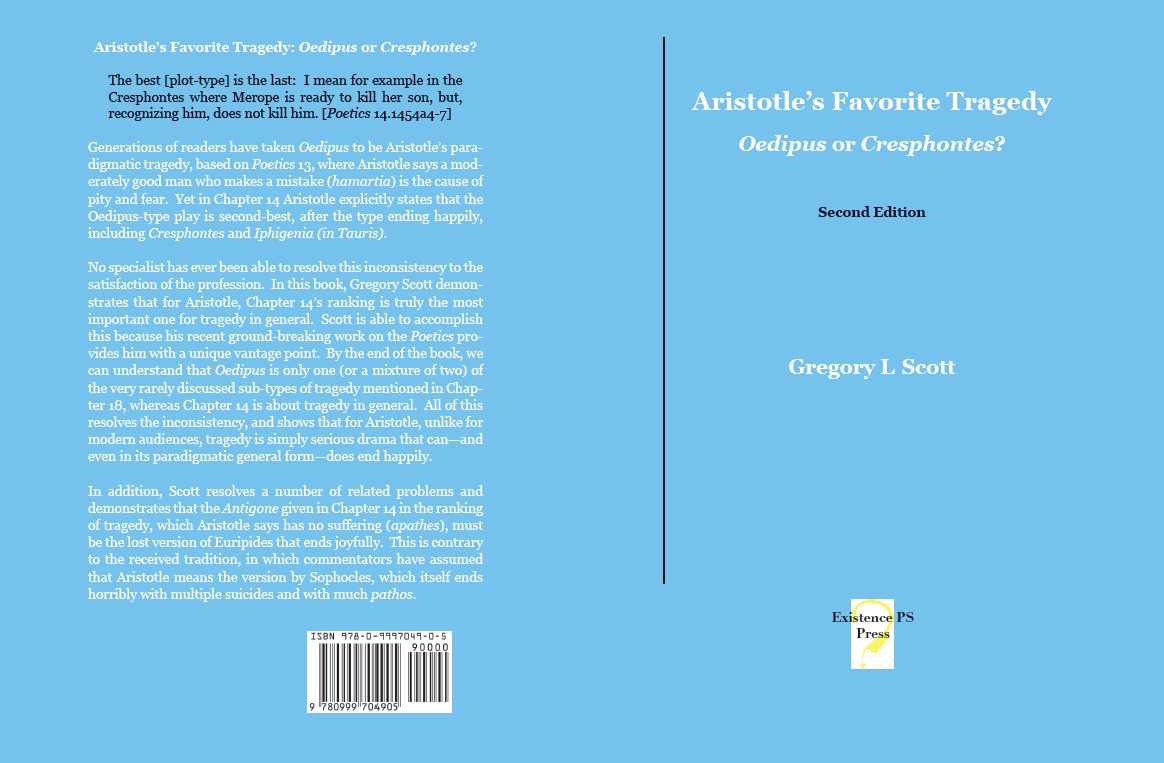
Paperback through Amazon:
USA: Aristotle's-Favorite-Tragedy-2nd-Edition
Canada: Aristotle's-Favorite-Tragedy-2nd-Ed
France: Aristotle's-Favorite-Tragedy-2nd-Ed
Germany: Aristotle's-Favorite-Tragedy-2nd-Ed
Italy: Aristotle's-Favorite-Tragedy-2nd-Ed
Spain:
Aristotle's-Favorite-Tragedy-2nd-Ed
United Kingdom:
Aristotle's-Favorite-Tragedy-2nd-Ed
Hardcover: ISBN 9780999704905 (List $17.95)
Paperback: ISBN 9780999704912 (List $9.95)
This book explains why, contrary to popular and professional opinion,
Aristotle does not hold Oedipus to be the best tragedy in general in the Poetics.
Rather he
means what he explicitly states in Chapter 14: The happily-ending plays like
Cresphontes and
Iphigenia (in Tauris) are the finest while the type that includes
Oedipus is only
second-best. The claim in Chapter 13 that Oedipus is best presupposes that
Aristotle is focusing at this point in the treatise only on a sub-species of tragedy, presumably one or a mixture of the sub-types noted in Chapter 18: tragedy of suffering, tragedy of character, simple/spectacular tragedy (the text is corrupt), and complex tragedy. Given Chapter 14, he cannot be considering tragedy in general in Chapter 13.
Even though “tragedy” has been the standard translation of tragōidia since the Renaissance, it is extremely misleading. No one has ever explained to the satisfaction of classicists in general whether tragōidia comes from “goat-song” or “song of the spelt (a type of beer)” or some other source and how it gets applied to the type of drama that Aristotle examines. Scott argues that a better translation is “serious drama” because the Northern Greek says three times in the Poetics that the tragōidia can go from fortune to misfortune or vice-versa. Also, again, in Chapter 14 the happily-ending plays are best.
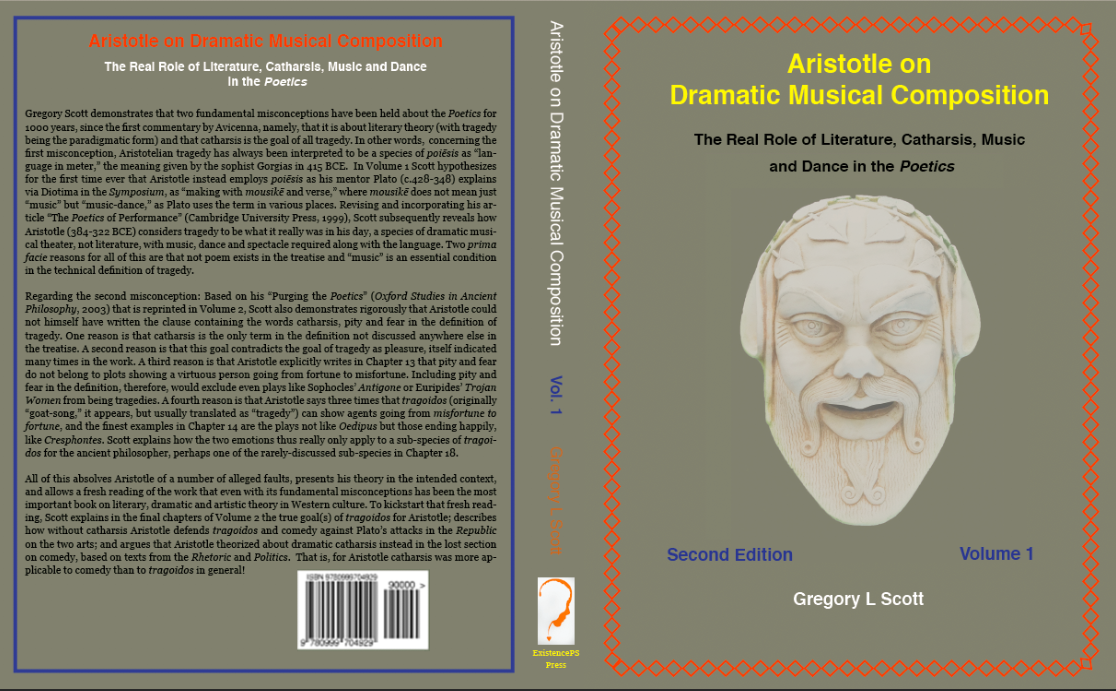
Paperback (through Amazon): Volume 1
USA: Aristotle-Dramatic-Musical-Composition-Ed2-VOL1
Canada:
Aristotle-Dramatic-Musical-Composition-Ed2-VOL1
France:
Aristotle-Dramatic-Musical-Composition-Ed2-VOL1
Germany:
Aristotle-Dramatic-Musical-Composition-Ed2-VOL1
Italy:
Aristotle-Dramatic-Musical-Composition-Ed2-VOL1
Spain:
Aristotle-Dramatic-Musical-Composition-Ed2-VOL1
UK:
Aristotle-Dramatic-Musical-Composition-Ed2-VOL1
Paperback (through Amazon): Volume 2
USA: Aristotle-Dramatic-Musical-Composition-Ed2-VOL2
Canada:
Aristotle-Dramatic-Musical-Composition-Ed2-VOL2
France:
Aristotle-Dramatic-Musical-Composition-Ed2-VOL2
Germany:
Aristotle-Dramatic-Musical-Composition-Ed2-VOL2
Italy:
Aristotle-Dramatic-Musical-Composition-Ed2-VOL2
Spain:
Aristotle-Dramatic-Musical-Composition-Ed2-VOL2
UK:
Aristotle-Dramatic-Musical-Composition-Ed2-VOL2
Volume 1 Paperback: ISBN 9780999704929 (List $48) |
Volume 1 Hardcover: ISBN 9780999704936 (List $68)
Volume 2 Paperback: ISBN 9780999704943 (List $39) |
Volume 2 Hardcover: ISBN 9780999704950 (List $53)
Purchasers of the 1st Edition: Because of errors in the first printing, ExistencePS Press will send a complimentary softcover of Edition 2 (both volumes) for no charge with proof of purchase and of shipping cost. Optionally, you may upgrade to the hardcover version of
Edition 2 at incremental cost, which is to say, your total cost of the first edition (including tax and shipping) will be credited to the total cost of the hardcovers (including tax and shipping). See "Read More" below and contact us for more information.
Click here for Updates, including Book Reviews for Edition 2
This book revolutionizes the 1000-year old tradition that stems from the first commentaries on the Poetics by the Arabic scholars: Aristotle's treatise has always been thought to be about poetic-literary theory, with tragedy being its paradigm. Scott demonstrates, however, that Aristotle (c. 384-322 BCE) employs poiēsis not in the way universally assumed until now, as “language in verse” or “poetry,” which the sophist Gorgias only coined in 415 BCE. Rather, Scott reveals how Aristotle follows Diotima, who, in the Symposium of Plato (c. 424-347), instructs Socrates on the theory of love and who also explains poiēsis as mousikē kai metra (“music” and verse), where mousikē can mean "music" or (better) "music-dance." One reason that Aristotle employs the Diotiman and not the Gorgian sense of poiēsis is that not one poem exists in the Poetics; another reason is that the definition of tragedy includes music and dance (rhuthmos).
For Previous Testimonials, click "Read More."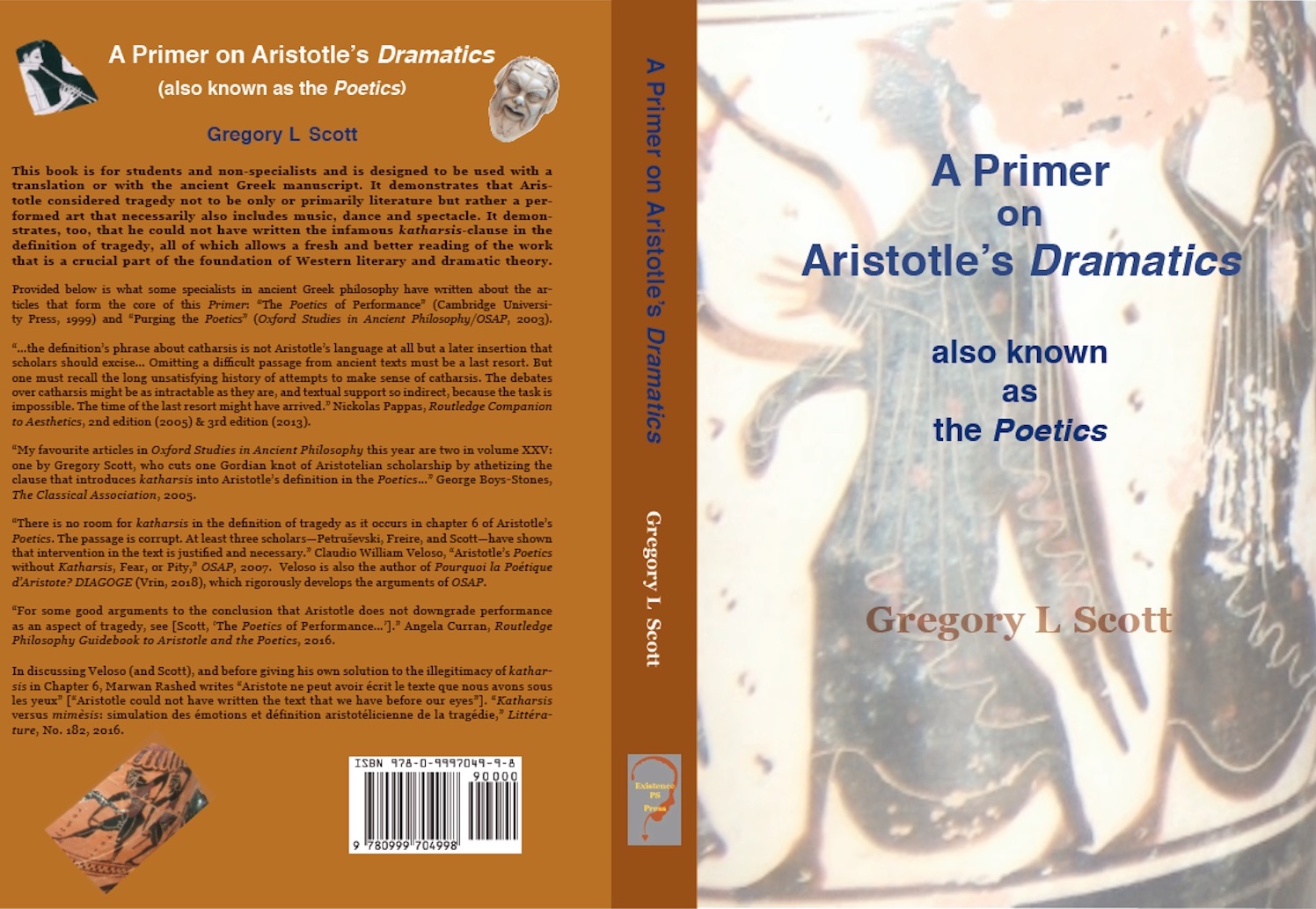
Paperback (through Amazon)
USA: A Primer on Aristotle's DRAMATICS
Canada:
A Primer on Aristotle's DRAMATICS
France:
A Primer on Aristotle's DRAMATICS
Germany:
A Primer on Aristotle's DRAMATICS
Italy:
A Primer on Aristotle's DRAMATICS
Spain:
A Primer on Aristotle's DRAMATICS
UK:
A Primer on Aristotle's DRAMATICS
6 x 9 inches; 368 pages with Index.
Hardcover: ISBN 9780999704998 (List $59.95)
Paperback: ISBN 9780999704981 (List $29.95)
Click here for Updates
This book is primarily for students and is designed to be used in tandem with the ancient Greek text or with any of the dozens of available translations generally titled The Poetics that cost a few dollars each or that are free on the Internet. The Primer provides the basic findings of Aristotle on Dramatic Musical Composition: The Real Role of Literature, Catharsis, Music and Dance in the POETICS (hereafter ADMC and described above) in less than 1/3 the number of words of ADMC.
This book has additional scholarship that goes beyond ADMC, included in two appendices. The first gives the conditions for properly understanding how catharsis (and pity and fear) might have been used by Aristotle in some sub-type of tragedy (as listed in Chapter 18) or in comedy.
The second appendix demonstrates that Posidonius, Strabo, and Plutarch are to be trusted in revealing how Aristotle’s library was corrupted in Scepsis and badly restored by Apellicon, which is when perhaps the catharsis-clause was wrongly interpolated. In any event, Scott shows that al-Fārābī (872-950), the “Second Aristotle,” is the very first scholar to briefly comment on Aristotle's goal of tragedy in the Dramatics (aka Poetics) that we possess. Yet al-Fārābī gives the goal (correctly) as pleasure, NOT as catharsis! Avicenna comments for the very first time 100 years later in Persia on a version that has catharsis, but Avicenna cannot make sense of the word in the definition of tragedy and so ignores it. (500 years earlier, Proclus had associated Aristotle by name to catharsis for the first and only time explicitly until al-Fārābī, but with respect to the dialogue On Poets/On “Musical” Composers that surely was an early treatment, when Aristotle was under the influence of Plato, who employs catharsis frequently and positively in his own doctrines; Proclus also relates catharsis to both tragedy and comedy.)
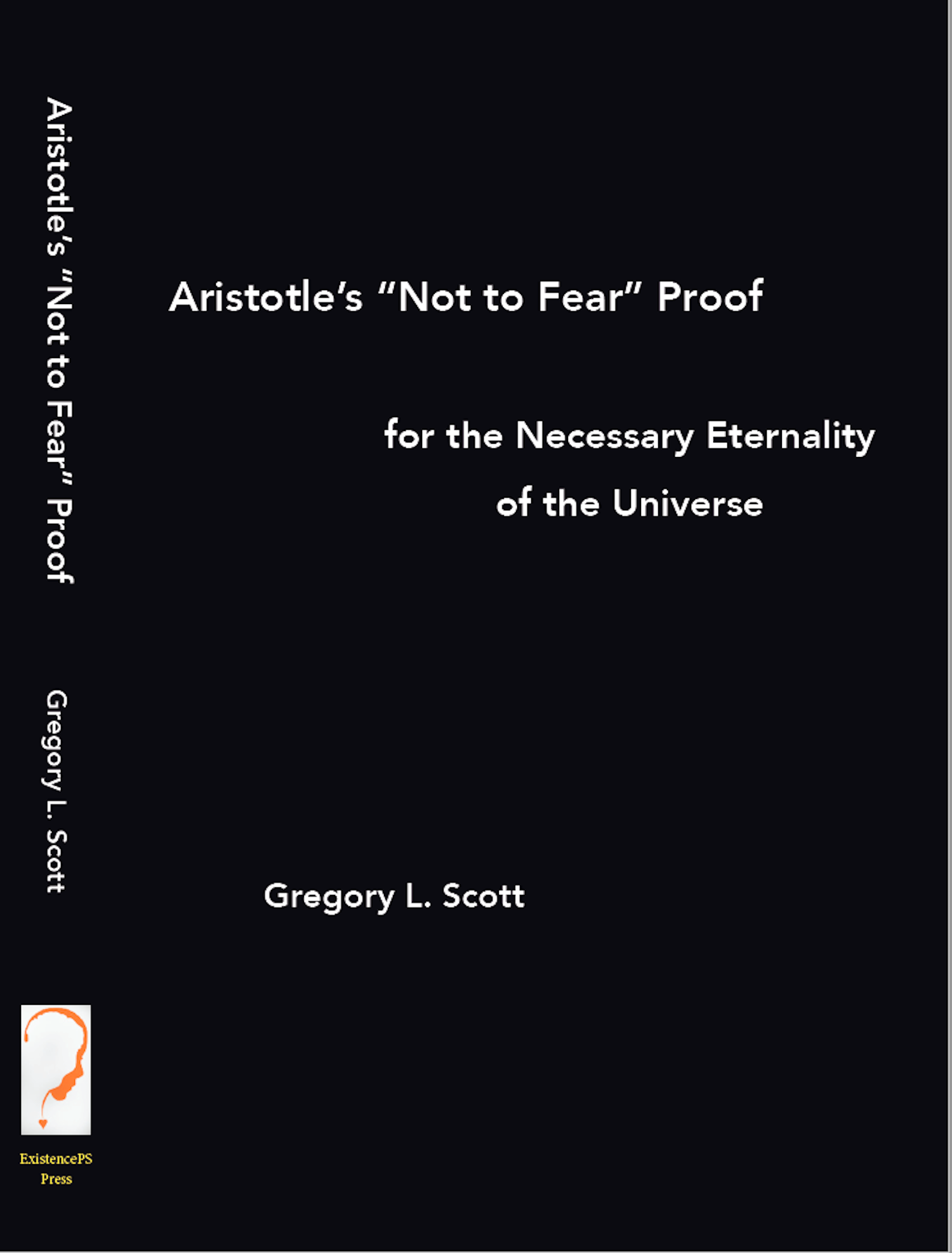
382 pages, including Index and Index Locorum.
For ordering apart from Amazon:
Hardcover ISBN-13: 9780999704974
List $73.95 ($44.95 as of 1 Aug 2021)
Softcover ISBN-13: 9780999704967
List $48.95 ($28.95 as of 1 Aug 2021)
The price of the book has been lowered to trigger more feedback for the 2nd edition planned for 2025/2026 that will incorporate 8 "digital extensions"; see the "Updates" link below for more details.
For ordering through Amazon, including a “Look Inside,” please click on your country's link—
USA: www.amazon.com
Canada: www.amazon.ca
UK: www.amazon.co.uk
France: www.amazon.fr
Italy: www.amazon.it
Germany: www.amazon.de
Spain: www.amazon.es
Despite its extremely paradoxical nature, Aristotle's Unmoved Mover of Metaphysics Lambda, also referred to as Pure Actuality and often called "God" by commentators, still convinces some atheists to become “reverse apostates.” One recent and well-publicized case is the British philosopher, Antony Flew, co-author of There is a God: How the World’s Most Notorious Atheist Changed His Mind (2007).
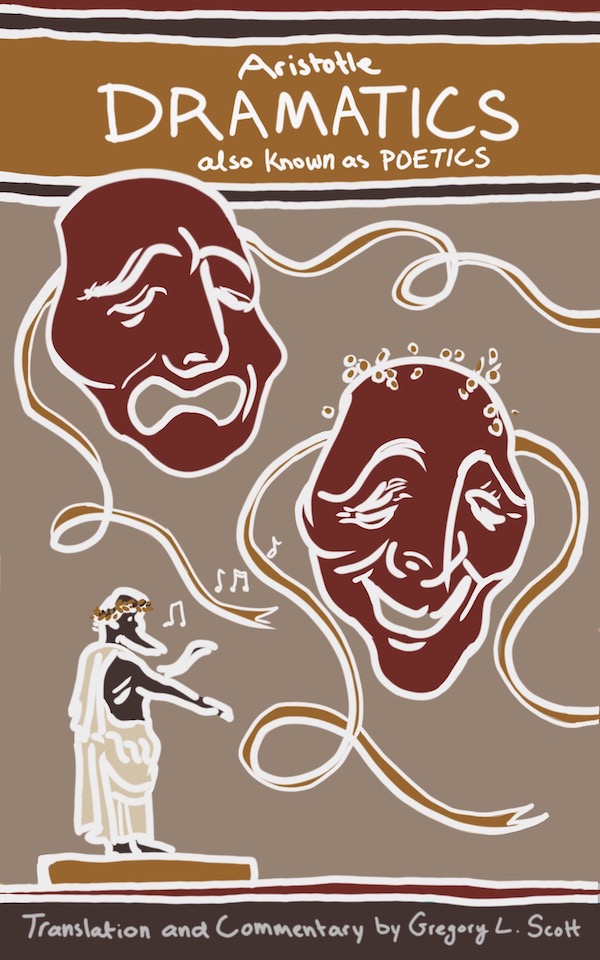
Through your favorite brick-and-mortar or online bookstore, or, for discounts, see the Academic Program above.
5 x 8 inches; 130 pages.
List Prices:
Hardcover $21.95 (ISBN-13: 978-1-952627-01-9)
Softcover $12.95 (ISBN-13: 978-1-952627-00-2)
For ordering through Amazon, including a “Look Inside,” please click on your country's link—
USA: www.amazon.com
Canada: www.amazon.ca
UK: www.amazon.co.uk
France: www.amazon.fr
Italy: www.amazon.it
Germany: www.amazon.de
Spain: www.amazon.es
This is the first translation of Aristotle's work that assumes the Northern Greek from Stagira employs the sense of poiēsis given by Diotima in Plato’s Symposium, mousikē kai metra (“music-dance and verse”), rather than the sense coined by the sophist Gorgias around 415 BCE, “language in meter.” Perennial dilemmas—like why the treatise has not one poem and why the Stagirite never even mentions the purely literary genres in a work long known as the Poetics—therefore simply dissolve. Aristotle’s theory, which focusses on musical drama and which has music and dance in the definition of tragedy, concentrates on only three art forms: tragedy, comedy and epic (which is noted in its definition to be “dramatic” and which was performed by rhapsodes typically singing, with gestures that count as “ordered body movement” or dance for the Greeks).
Against a long-standing condemnation of Aristotle's exclusively literary and textual bias, Scott's interpretation reveals the Northern Greek to be much more sensitive to music, dance and other issues of performance of contemporary concern in the study of drama.
The translation is an emendation of one of the most renowned versions of the 20th century, by Ingram Bywater (1920), and corrects the seven core Greek terms, along with the 10 chapters (of 26), that have been misunderstood for generations. It takes advantage of the acclaimed Greek edition by L. Tarán and D. Gutas (Editio Maior, 2012), which itself offers no translation.
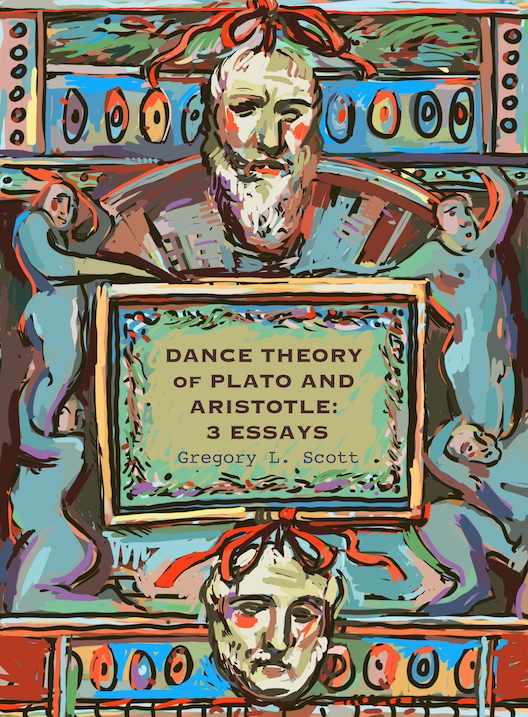
329 pages; 396 with Index & Bibliography
130,000 words
List Price Softcover: $24.99
ISBN-13: 978-1-952627-02-6
For ordering through Amazon, please click on your relevant country:
USA: www.amazon.com
Canada: www.amazon.ca
UK: www.amazon.co.uk
France: www.amazon.fr
Italy: www.amazon.it
Germany: www.amazon.de
Spain: www.amazon.es
Ordering through bookstores, and easier online global distribution for other regions, are planned for late 2025 or early 2026.
This book is for dance theorists, lovers of musical theater, classicists, historians of ideas, and specialists in Ancient Greek philosophy, Western aesthetics, or feminism. Knowledge of Ancient Greek is not required.
Presentation to the International Aristotelian Conference, University of Lisbon, July 2025
Downloadable pdf: Buarque provides at least part of the background of Chapter 17 of Aristotle's Dramatics aka Poetics, revealing, if inadvertently, how important staging and costumes are for the Northern Greek from Stagira.
Downloadable pdfs, including Presentations and Handouts, of the debate on 2 July 2025, with Scott arguing that the divine fifth element of De Caelo was Aristotle's final theological stage and Veloso denying it (with Veloso's Abstract in English but his Presentation and subsequent arguments in French).
The continuation of the written debate after Lisbon, July-Sept 2025.Downloadable pdf of the following replies and rebuttals.
Summary and ConclusionDownloadable pdf, including a brief description of Scott's in-progress Aristotle's Apostasy: From the Thinking God (aka Unmoved Mover) of METAPHYSICS Lambda to the Divine Fifth Element of ON THE HEAVENS, anticipated publication late 2026.